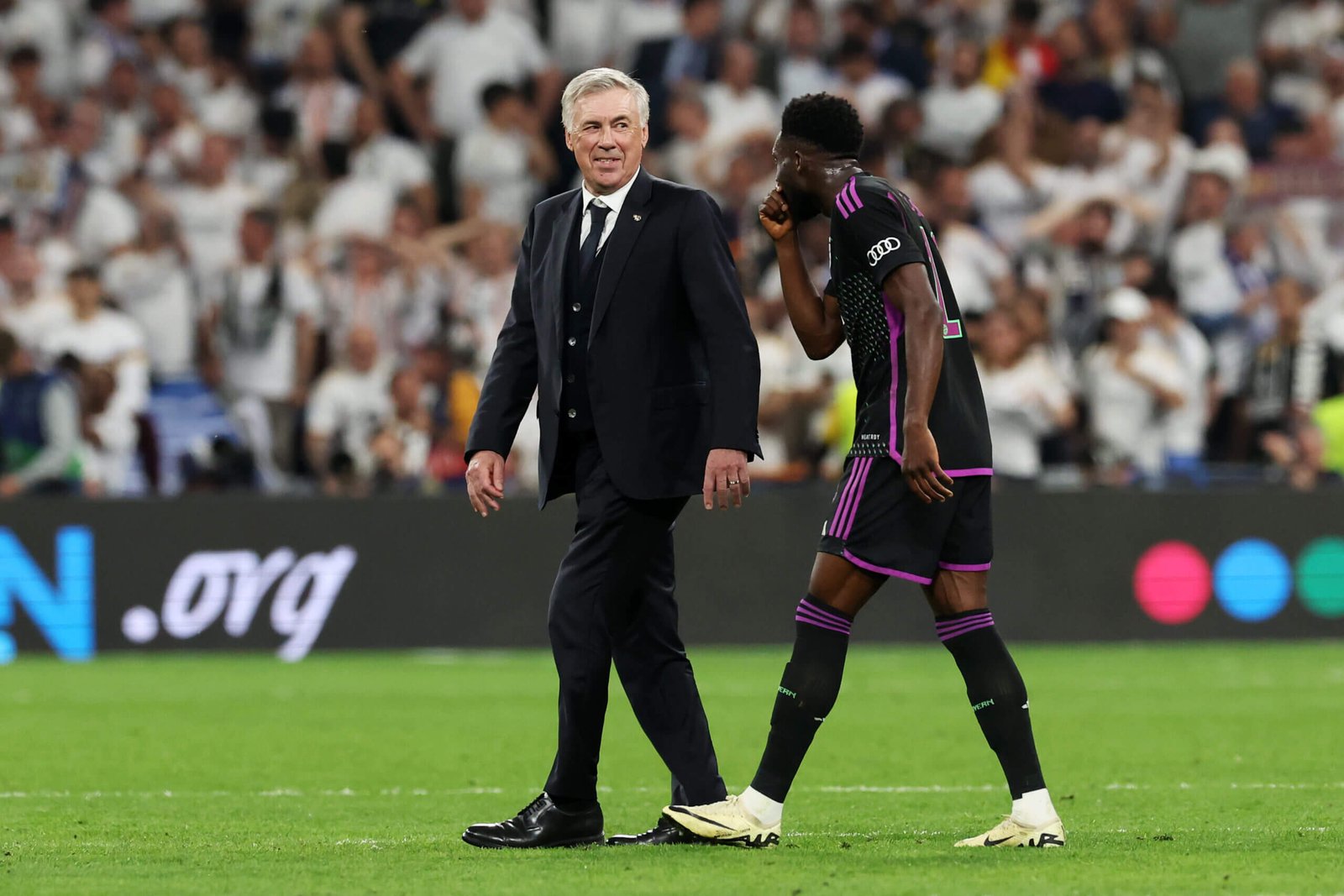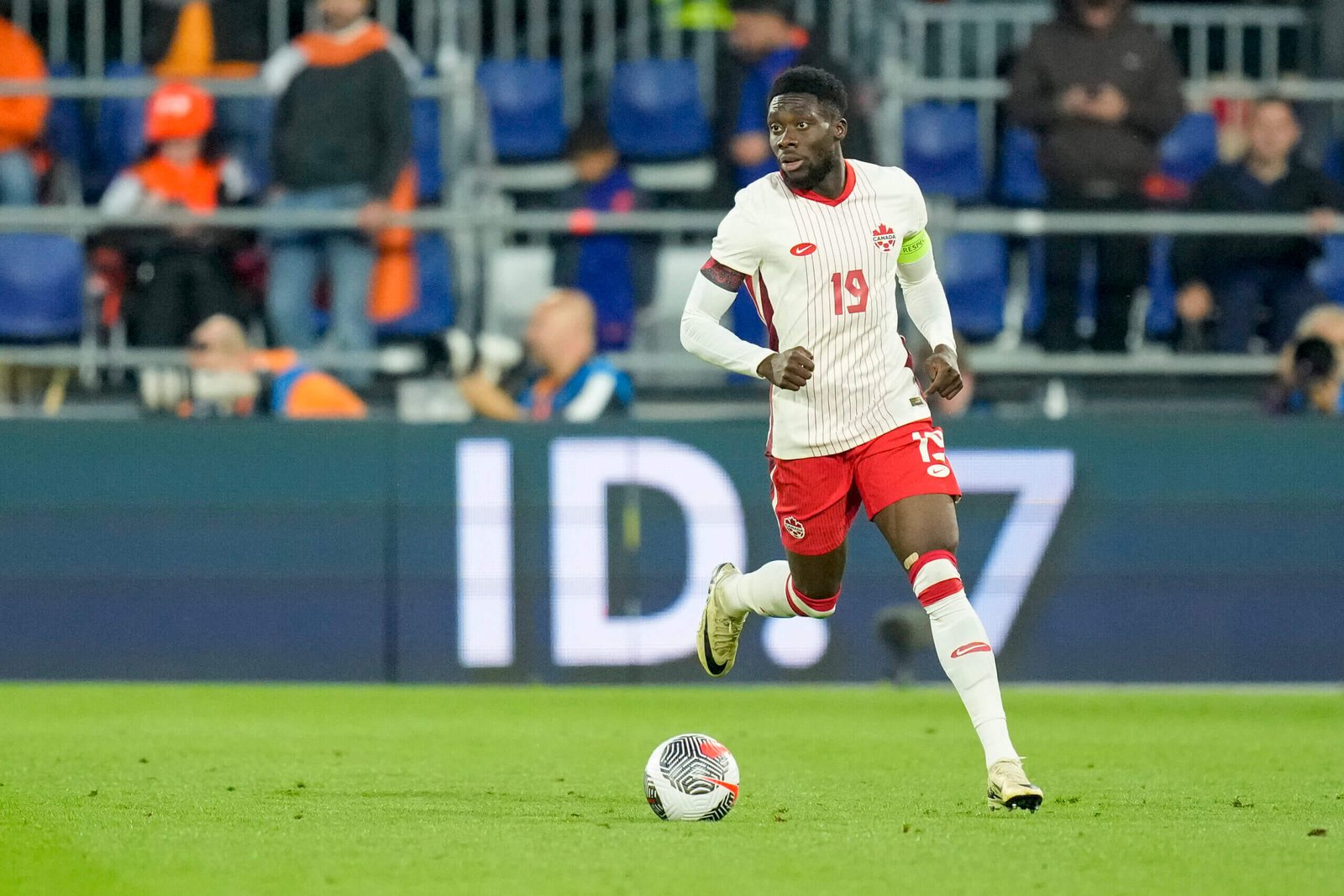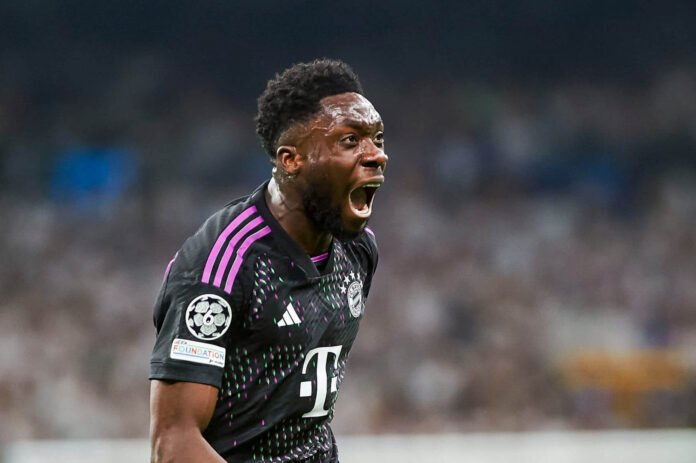Most footballers reach a pivotal crossroads at some point in their career and it appears that the summer of 2024 might be that moment for Alphonso Davies.
The 23-year-old has a huge decision to make in the coming weeks (or months). After six years in Germany with Bayern Munich, his current contract expires in 2025 and his club will not want to run the risk of allowing him to leave for free. Real Madrid are lurking ominously.
On the international stage, Davies is about to play in his and Canada’s first ever Copa America. He has been given the captain’s armband and challenged to lead the team in more ways than one.
On June 9, Davies comes up against Kylian Mbappe when France play Canada in Bordeaux. Will the pair be team-mates at the Bernabeu next season?
Get the latest transfer news on The Athletic…
Davies has been admired by Real Madrid for some time and in February the possibility of a move to Spain looked likely when talks were held between the club and Davies’ representatives.
It’s believed that a verbal agreement was reached on personal terms — with one scenario for 2024 should Real and Bayern agree a transfer fee, and another agreement (much less likely) for 2025 when Davies could be available on a free, the worst-case scenario for Bayern.
Then things went quiet. Madrid, to the surprise of Davies’ people, seemingly went cold. There was no contact for three months.
From Madrid’s point of view, they were focusing on the end of the season and pending contract renewals, with work on incomings to resume when the campaign ended.
Davies did not only have his heart set on Madrid. Relations with Bayern have remained professional and talks over whether he will stay have continued during recent months, including in the week of the first leg of their Champions League semi-final against Madrid.
In the second leg in Spain, Davies leapt off the subs’ bench and came close to knocking his potential future employers out of the competition, when he put Bayern in front with 22 minutes remaining.
Davies played, and scored, against Real Madrid in the Champions League semi-finals (Clive Brunskill/Getty Images)
Sources, who spoke to The Athletic on the condition of anonymity to protect relationships, indicated those talks with Bayern were progressing well and the German club were hopeful of agreeing new terms to keep Davies in Munich, especially with Madrid having gone quiet.
In public, Bayern’s stance has been clear. Max Eberl, their new sporting director, stated either a contract renewal or a sale were the only options, including a deadline that the player did not accept. Financially, the club cannot afford for Davies to leave for free next summer.
After positive recent talks, all signs pointed towards Davies staying. Bayern’s new head coach Vincent Kompany is said to be eager to work with the player and one of the topics broached during his conversations with the club was his belief that Davies could be rejuvenated.
Kompany has spoken directly to Davies, telling him that he is counting on him as part of his vision for Bayern.
And yet, for all those talks, Bayern have always remained reluctant to meet Davies’ €20million (£16.9m; $21.6m) salary demands. The closest they have come is a €13million offer that, so far, remains unsigned. A compromise may be reached but, with the summer now upon us, it hasn’t happened yet.
There is no sense either that Bayern would be willing to accept anything less than a €50million fee for the player, despite his contract situation.
Enter Madrid (again).
In the aftermath of them winning the Champions League final against Borussia Dortmund, Real have reignited their interest in Davies.

Real have reignited their interest in Davies (Alexander Hassenstein/Getty Images)
The European champions are approaching any possible deal for Davies from the premise that they will not invest a large amount of money for a player whose contract expires in 2025 and whose club will likely be forced to sell him for a reasonable fee this summer if he does not renew.
That is why they have asked the full-back on several occasions not to extend his contract and to ignore possible higher offers — as happened before they signed Aurelien Tchouameni, Jude Bellingham and, more recently, Mbappe.
The race for Davies is on, but there is a sense that he is slightly leaning towards renewing with Bayern.
There is important context to add from Bayern’s perspective in that they have got a couple of promising young players coming through in Davies’ position; Frans Kratzig, who has been out on loan in Austria, and Matteo Vinlof, who has playing for their second team in the Regionalliga (the German fourth tier). There is Adam Aznou, too, who they signed from Barcelona in 2022. They’re not as afraid of losing Davies as some might think.
However, while those youngsters develop, there is a feeling that the most cost-efficient way of bridging the gap to that new era would be to extend Davies’ deal, rather than to sign a new first-choice starter for the next two or three years.
Additionally, the funds for that new player would have to come from a sale, meaning that — during a summer when a big squad overhaul is already planned — Bayern are hesitant to create more work for themselves.
If the stress of all this is getting to Davies, it showed on Thursday night when he endured a pretty torrid evening.
Captaining Canada for the first time, Davies struggled. The Netherlands’ first three goals came from his side of the field and he was consistently beaten in one-on-ones by Bayer Leverkusen’s Jeremie Frimpong.
Davies won only three of his eight duels and gave the ball away 10 times (only one team-mate conceded possession more). It wasn’t the start he will have wanted as the team’s new skipper.

Davies endured a tough evening against the Netherlands (Alex Gottschalk/DeFodi Images via Getty Images)
Juggling interest from arguably the world’s biggest football club with an extension offer from Bayern has undoubtedly been a tall task for Davies’ agent, Nedal Huoseh, who was originally a Davies family friend and one of his first coaches as a child when he agreed to represent the young phenom as his first and then-only client. Huoseh’s agency has since grown with a stable roster of Canadian talent.
It’s easy to see how the continued uncertainty over Davies’ club future could impact his performance with Canada in one of the biggest years in the nation’s footballing history. Friendlies against two of the best teams in the world, Netherlands and France, come ahead of Canada’s first appearance at Copa America. They will open the tournament against World Cup champions Argentina on June 20.
Davies’ role for Canada remains a topic of debate. His performances during Canada’s historic run to the 2022 World Cup in Qatar were electric and decisive, but come the World Cup itself, Davies was played in multiple positions and his performances didn’t equal the highs he had previously hit at Bayern.
In truth, they haven’t since, either. Despite continually playing alongside the likes of Thomas Muller, Manuel Neuer, Joshua Kimmich and now Harry Kane, all leaders and role models on and off the field, Davies hasn’t yet evolved into the true leader Canada hope he will become, albeit he is still young at 23.
Multiple sources inside Canada’s men’s national team, also speaking on the condition of anonymity to protect relationships, have described Davies as not always joining up with the national team with the same positive attitude and mindset that he had earlier in his Canada career, when they had the clear goal of trying to qualify for the 2022 World Cup.
Although, it’s important to note that Davies was not the only player unhappy in Canadian camps in 2023. The prolonged and public disagreements with Canada Soccer over collective bargaining agreements (CBA) for the men’s and women’s national teams, and the departure of coach John Herdman, led to frustration about the future of the program. Though those CBA negotiations hit a wall with executive turnover in 2023 and are currently ongoing, there is definitely greater optimism among the men’s players under the new head coach Jesse Marsch.
Davies has wanted to be Canada captain since the World Cup in Qatar but for that to happen, his role within the team needed to change. He needed to become more vocal, try to take younger players under his wing and make himself available to the media more consistently.
Davies spoke to the media during a training camp in March, which was the first time he had done so since the World Cup. He did so again before the Netherlands game but, again, it’s rare, especially when you consider how often you hear from players like Kane and Muller; figureheads and spokespeople for their national teams.
That’s been an issue at Bayern, too, where journalists have been disappointed with how infrequently he stops to talk to the press after matches. Perhaps this is not hugely important in the grand scheme of things, but it’s also not something you can get away with at Madrid, for example.
Moving forward, some sort of stability over his future would undoubtedly allow Davies to play with some weight off his shoulders and perhaps rediscover some of the joy he showed early in his national team career.
Under Marsch, there have already been repeated calls for Davies to simplify his play on the field and not dictate the tempo of the game on his own.
“Off the pitch, (Marsch) challenged me,” Davies said. “He asked me questions, difficult questions, that I don’t really think (about) every day. It’s a challenge with those questions. It put me in a position where I’m not really comfortable in. But I know that it’s part of life. You have to rise to the occasion.”
As he approaches his career crossroads, Davies knows he needs to heed his own words.
(Additional contributors: Seb Stafford-Bloor, Joshua Kloke)
(Maria Jose Segovia/DeFodi Images via Getty Images)
Read the full article here


